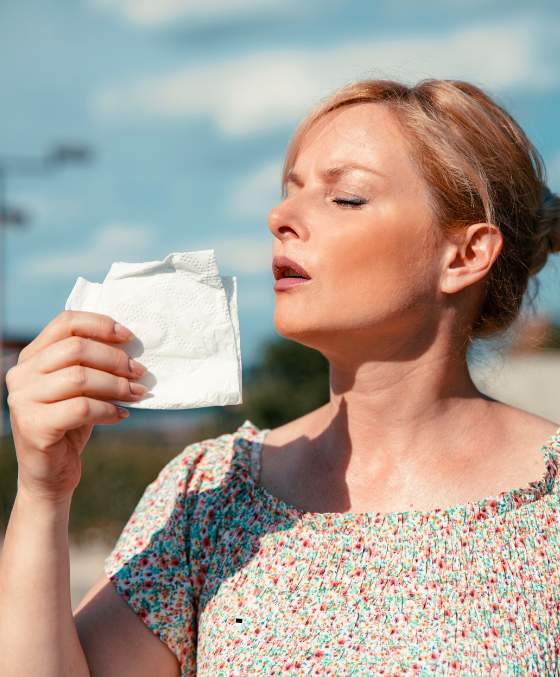Hot Flashes
Hot Flashes and Hormonal Imbalance
Hot flashes are one of the most well-known symptoms of perimenopause and menopause, but they can also occur during hormone replacement therapy (HRT) adjustments. These sudden, intense bursts of heat can be uncomfortable and disruptive, affecting daily activities and sleep patterns. Hot flashes can happen without warning, often followed by a cold sweat, leaving individuals feeling both physically and emotionally drained. Understanding the hormonal causes of hot flashes and how to manage them can help you feel more in control during this phase of life.
The Hormonal Link to Hot Flashes
Hot flashes occur when there’s a sudden shift in your body’s temperature regulation system, and hormones play a central role in this. Here’s how the main hormones involved in perimenopause, menopause, and HRT influence hot flashes:
- Estrogen – Estrogen helps regulate the body’s temperature. When estrogen levels decrease during perimenopause or menopause, the hypothalamus (the body’s temperature control center) becomes more sensitive to small changes in temperature, triggering hot flashes.
- Progesterone – Progesterone works alongside estrogen to maintain hormonal balance. A drop in progesterone levels can contribute to the frequency and intensity of hot flashes.
- Testosterone – While testosterone is typically thought of as a male hormone, it also plays an important role in women’s health. Low levels of testosterone during menopause may contribute to increased irritability and the perception of hot flashes being more severe.
- Cortisol – Elevated stress levels can exacerbate the severity of hot flashes. High cortisol levels, often linked to hormonal changes, can make the body more sensitive to temperature fluctuations.
What Hot Flashes Feel Like
- Sudden Intense Heat – A feeling of warmth that starts in the chest, face, or neck and spreads throughout the body.
- Flushed Skin – Your skin may become red and blotchy, especially on the upper body and face.
- Sweating – As the hot flash peaks, sweating often follows, leaving you feeling drenched.
- Cold Chills – After the hot flash subsides, you may experience chills or a cold sweat.
- Increased Heart Rate – Some individuals may notice an increase in heart rate or palpitations during hot flashes.
These episodes can last anywhere from a few seconds to several minutes, but the intensity and frequency can vary significantly between individuals.

Coping with Hot Flashes: Tips and Treatments
At New Insights Health & Wellness, we recognize that hot flashes are more than just an uncomfortable experience—they can significantly affect your quality of life. That’s why we take a holistic approach to treatment that includes both medical solutions and lifestyle strategies.
✅ Hormone Therapy (HRT)
Hormone replacement therapy is often the most effective treatment for hot flashes. By restoring estrogen and progesterone levels, HRT helps regulate the temperature control system in your body, reducing the frequency and intensity of hot flashes.
✅ Medications
In some cases, additional medications can be prescribed to manage hot flashes. These may include low-dose antidepressants, anti-seizure medications, or blood pressure medications. These medications work by regulating neurotransmitters or impacting blood vessels, helping to reduce the intensity of hot flashes.
✅ Acupuncture and Herbal Supplements
Some individuals find relief from hot flashes through acupuncture or the use of herbal supplements. Black cohosh, evening primrose oil, and red clover are examples of supplements that may help with hot flash relief. However, it’s important to consult a healthcare provider before starting any supplement regimen.
✅ Healthy Habits
Maintaining a balanced diet, exercising regularly, and getting enough sleep are essential for overall well-being. Regular physical activity can help regulate your body’s temperature control system, while a balanced diet rich in nutrients can support hormone health and minimize the impact of hot flashes.
✅ Lifestyle Adjustments
There are several ways to manage hot flashes through lifestyle changes:
- Wear Lightweight Clothing: Dressing in layers and wearing breathable fabrics like cotton can help your body regulate its temperature.
- Stay Cool: Keep cool by using fans, drinking cold water, or applying a cool compress to your neck or face.
- Avoid Triggers: Spicy foods, caffeine, alcohol, and stress can trigger hot flashes. Pay attention to your body’s responses and try to avoid known triggers when possible.
- Mindfulness and Relaxation Techniques: Practices like yoga, meditation, and deep-breathing exercises can help manage stress and potentially reduce the frequency of hot flashes.
Emotional Impact of Hot Flashes
The physical discomfort of hot flashes is often accompanied by emotional challenges. Hot flashes can disrupt sleep, leading to fatigue and irritability. The unpredictability of hot flashes can also cause anxiety or embarrassment, especially in social situations. Addressing both the physical and emotional impacts of hot flashes is key to improving your overall quality of life.
